On the New Hampshire campaign trail: What some candidates are saying about climate change. (Spoiler alert: It’s smart.)
By Dan Drollette Jr | February 10, 2020
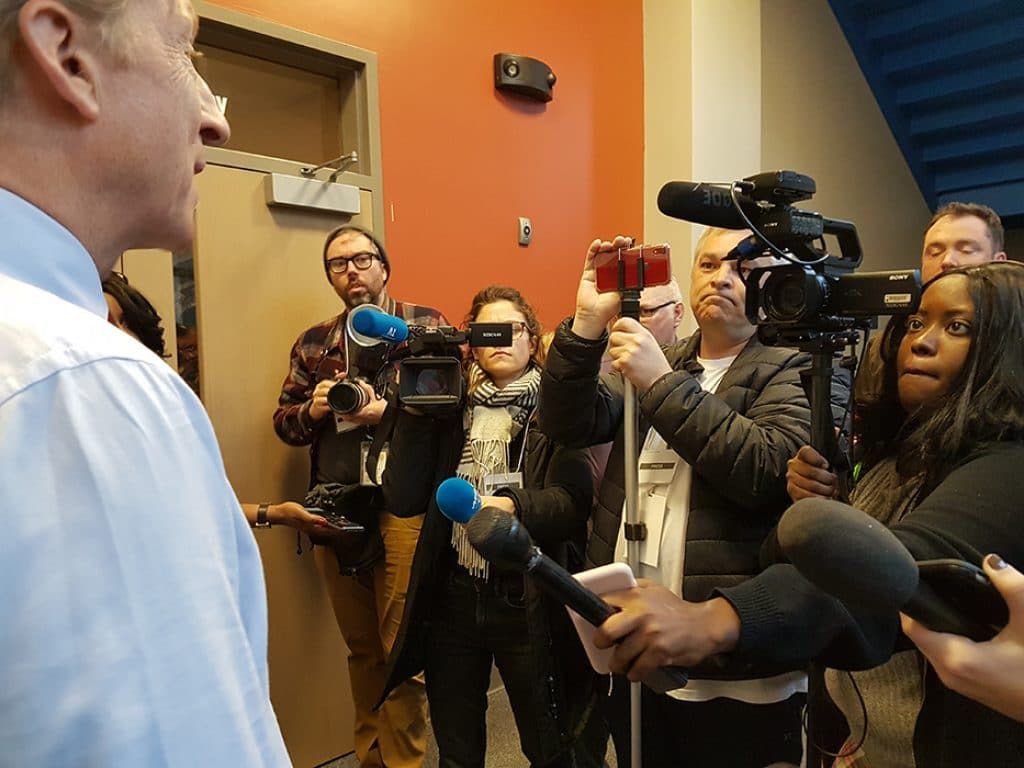 Democratic presidential candidate Tom Steyer faces the media in a "press gaggle" in Concord, New Hampshire, less than a week before ballots are cast in the primary.
Democratic presidential candidate Tom Steyer faces the media in a "press gaggle" in Concord, New Hampshire, less than a week before ballots are cast in the primary.
When I discovered that the “2020 N.H. Primary Candidate Tracker: Where and When to See the Candidates” showed that six presidential candidates (five Democrats and Republican Bill Weld) would be in one place shortly ahead of the New Hampshire primary, I got in my car and drove the 110 miles from my home in Massachusetts to Concord, New Hampshire to attend. It would be like shooting fish in a barrel, I thought; not only were the candidates themselves going to be there, but the theme of the event was right on my climate change beat: a day-long “New Hampshire Youth Climate and Clean Energy Town Hall,” with a different speaker every hour.
The folks scheduled to appear were Bill Weld, Andrew Yang, Bernie Sanders, Pete Buttigieg, Elizabeth Warren, and Tom Steyer. Surely, I thought, I could get at least some of them to speak about what they would do about climate change and the other existential risks they’d face if elected to office.
Here is what happened:
8:10 a.m. Keene, New Hampshire
Halfway to my destination, I saw I would be coming close to Lindy’s Diner, which ABC News listed as one of its “5 New Hampshire Diners Presidential Candidates Need to Visit to Win the State’s Primary.” I decide to take a short detour to downtown Keene for coffee and breakfast at this classic New England chrome and glass dining car. Its new owner, Carroll Stubbs, proudly tells me it was built by the Piedmont Diner Corporation and transported to this site in 1961, where it has been operating ever since. When asked if any politicians have been in lately, Stubbs replies that Joe Biden visited back in November. In fact, Stubbs says, “This is where Biden made the notorious comment: ‘What’s not to love about Vermont.’ ”
The New Hampshire primary appears to have been given some extra zip by the failure of the app that was supposed tally up results from Monday’s Iowa caucuses. It seems like every Democratic candidate has been declaring victory in Iowa as a result, leaving the race still unclear as to a frontrunner—which consequently means that there’s been a doubling-down on New Hampshire as the first real chance to see how each candidate is actually doing. Or so say articles such as the New York Times’ “Democratic Infighting Escalates as Candidates Await Iowa Results,” “Turning to New Hampshire, Democratic Rivals Jostle for Advantage,” and “Bloomberg Plans to Double Ad Spending After Iowa Caucus Problem.”
I hop back in my car.
10:05 a.m. Concord, New Hampshire
Passing through a pedestrian walkway on my way to the candidates’ town hall, I notice that the hallways of the adjacent Hotel Concord are filled with photos of politicians campaigning in New Hampshire, from all ends of the political spectrum. The hotel has a permanent exhibit in the building and an extensive Presidential Primary page on its website, along with a calendar showing who is campaigning where. “NH Primary Day” is in bright orange. With some 30 separate political eve events in the state listed for the day before the primary, there’s simply not enough space to fit them all in the calendar box allotted to that date. The box simply has links to four early events and a final link: “+26 more.” The events include multiple appearances by most of the remaining Democratic presidential candidates and a 7 p.m. rally for President Trump.
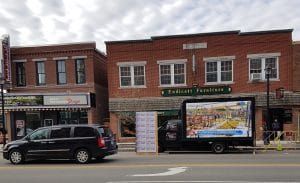
Mid-morning to noon. The NH Youth Climate and Clean Energy Town Hall, Bank of New Hampshire Stage, Concord
A few impressions.
First, the venue itself is extraordinarily small—a two-story, brick, converted movie theater that only holds about 300 seats. People constantly filter in and out—including college students, school groups, and clusters of reporters—so there seems to be a good chance of getting in to a seat at some point throughout the day.
The second thing I notice is a large Trump sound truck parked on the street, as close as possible to the front door. Each side of the truck is covered with a huge video screen tuned in to Fox News, running what seems to be an endless pre-recorded loop at full blast, charging malfeasance and sexual misconduct among Trump’s opponents. The loudspeakers are blaring at such a high volume that it’s next to impossible to hold an intelligible conversation on the sidewalk.
Which seems as good a metaphor for American politics today as any.
But the folks on the sidewalk seem undeterred, with protestors from Climate Action Now, several environmental organizations, and the Bernie Sanders campaign—among others—waving placards calling for action and wearing hats with the slogan “Make Earth Cool Again.”
A few cops stand around in uniform to keep an eye on things, but the crowds seem good-natured enough. The crowds have apparently been here since early today; I later overhear a reporter from Boston radio station WBUR do a live interview where he says: “People are really animated and excited. I arrived here at 7:30 a.m., and there was already a line out the door.”
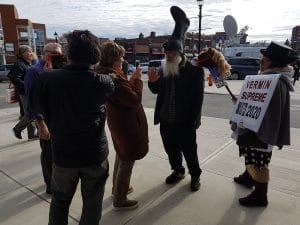
A collection of TV cameras is clustered on the sidewalk farthest from the Trump truck. They’re all centered on a political activist who calls himself a performance artist, who is wearing a rubber boot on his head and carrying a sign saying “Vermin Supreme.” In response to a question, I hear him tell the press: “Humanity is doomed. Thank you.”
Noon-1:00 p.m. Circulating inside the venue lobby while waiting for the candidates to come out.
Jake Roche, from the Union of Concerned Scientists, says he is here to, in his words, “bird-dog” the candidates. When he sees my puzzled expression, Roche explains that he has been trying to catch the candidates as they enter and exit, shouting questions at them and trying get them on the record about no first use of nuclear weapons and the problems of having one person—the president—have sole authority to launch a nuclear attack; their subsequent responses have been assembled into a continuing series of podcasts. In other words, a much bigger, longer-term, and more extensive version of what I was hoping to get regarding climate change.
His wife, Lindsey Perry, is also there, in her role as field director for the League of Conservation Voters, and they and their colleagues fill me in on the latest developments since the Town Hall website was last updated: Bernie Sanders and Elizabeth Warren could not attend in person, because as serving US senators they had to be in Washington to vote on impeachment. Pete Buttigieg, whom I didn’t see on the initial iteration of the roster, has already spoken and left. Biden was never scheduled to speak—but that’s not necessarily a mark against him, as there are many events to attend all over the state, and things are getting down to the wire in the New Hampshire primary campaign. They also tip me off to logistics—there’s a room upstairs set aside for volunteers and the press, where you can sit down at a table and do your work. There’s a set of speakers transmitting the events live on the stage, so you can hear and see what’s going on even if you’re not in the auditorium.
I take advantage of a lull in the proceedings to work the booths that wrap around the first floor, where folks from environmental organizations hand out swag, distribute leaflets, and otherwise promote climate change awareness. (One of my favorites is a hand-held fan that calls for climate action now.) I spend quite a bit of time quizzing a representative from the Hubbard Brook Experimental Forest in the White Mountains, one of the longest-running and most comprehensive ecosystem study sites in the world, about the unmistakable evidence they’ve found over the decades for climate change: decreasing snowpack, less lake ice, less snow (but more ice storms), fewer cold days, heavier and more frequent precipitation.
1:30-4 p.m. NH Youth Climate and Clean Energy Town Hall: Rules of the game
It turned out that there is an etiquette to this kind of reporting, full of unspoken rules or norms of behavior—rules which I’d broken, without knowing it. Yes, candidates are eager to talk to the press, but these days, that definitely comes second to posing for selfies with constituents. Only after that is done, is it permissible to throw questions at them. That said, it’s perfectly acceptable for members of the press to jostle one another, elbow their way in to the front of the line, and accidentally (or purposely?) bump their rivals with a long TV camera lens.
And sometimes you’ll be asked to stand and wait in what one campaign press person explained to me was called the “press gaggle”—in this case, an informal section of stairwell in the lobby, where everyone from the press lined up, cameras, tripods, and recording equipment in hand, each microphone aimed like a weapon at the candidate. (In a telling coincidence, they’re known as “shotgun” microphones in the trade.)
One other peculiarity: While everyone in the press corps competes to get in a question sidewise, they all instantly go silent the split-second the candidate opens his mouth to answer a question—everyone is eager to record it, and get clean audio.
After Democratic candidate Deval Patrick finished up, I waited for him to be done with the selfies, then asked him what he would do about climate change if elected, given that he would most likely face a hostile Congress.
In Patrick’s words: “Yes, we’ll face a recalcitrant Congress, but that’s because the other side has been playing the long game, building up their infrastructure and solidifying their base. It’s more than just getting a new president in, it’s rebuilding—and it’s a matter of also removing the influence of gerrymandering and dark money.”
And later, I was to get Tom Steyer to say that fighting Trump and the oil companies “will be a lot of fun. Just because the stakes involve the end of the world doesn’t mean that it [the battle] won’t be a lot of fun.”
I was unprepared for Andrew Yang (who gave an impressive, knowledgeable, and passionate speech about climate change on the Town Hall stage) to descend from the stage, shake my hand, scowl, and quickly walk away.

4-6:30 p.m. Lessons learned.
One of the things I was surprised by was the high-quality level of the questions from the audience at the Town Hall. There were surprisingly deep, well-thought questions coming from a hand-picked group of three people per hour on the stage, asking about carbon pricing, resiliency, flood insurance, the problem of continuing fossil-fuel subsidies, and the like. All were New Hampshire high school or college students; each was allowed to ask two questions and given five minutes for each question-and-answer. Every hour, when a new candidate came up on to the stage, a new trio of questioners was waiting, with fresh questions in hand. (No questions were allowed from the audience.)
Each time someone posed a question, that person’s picture would appear on a giant screen at the back of the stage, giving the individual’s name, age and background. One—Kathryn Bennett—was a grad student in environmental science from the University of New Hampshire, studying methane gas releases in the Arctic. Another—Isabel Boettecher—had a parent who ran a small business and was worried about the costs of fighting emissions. A third—Olivia Gresham—described how her family home had been flooded by Hurricane Sandy and wanted to know how the candidate hoped to deal with those displaced by rising seas. And some had questions that I would have liked to ask.
I later found out from one of the Town Hall organizers—Rob Werner of the League of Conservation Voters—that each trio of questioners was carefully selected, out of dozens of applicants. All had sent in a video as part of the competition process, so that they could be judged as to their ability to handle themselves on stage—and then were given coaching and media training, so that their questions were as clear, concise, personal, and affecting as possible for this public venue. In some ways, it sounded like the training for a TED talk.
In responding, all the candidates emphasized their support for the Green New Deal; more than that, they all emphasized the role of hard evidence, science, and expertise in dealing with the challenge of climate change—and that they would work hard to reverse the current exodus of scientists from federal government.
There were indeed differences in candidate responses—though it was hard to make an apples-to-apples comparison, because each candidate faced a different set of questions about different aspects of climate change, coming from a different trio of student questioners. And each candidate liked to steer the conversation toward a favored campaign topic.
For example, in response to Olivia Gresham’s question about people displaced by flood, Andrew Yang said that the middle class and the poor are hit hardest by climate change, with no money to go elsewhere and no financial reserves, so “[w]e [American society] can’t just say that you’re on your own. We must contribute, and we must make victims whole”—and then he used that answer to segue into an argument for his proposal for a universal basic income, a noted hallmark of his campaign. And Yang tied the need to move away from the use of fossil fuels—the prime culprit behind climate change—to national and global security, saying that a clean, renewable energy economy would lessen the opportunity for conflict caused by waves of climate refugees. (Yang also managed to squeeze in one of his most memorable lines, saying that the country needs to financially reward companies for taking on climate change in their manufacturing and design and operations, rather than just simply penalize those behind the curve. Or as he expressed it: “We need to make sure that companies win for doing the right thing.”)
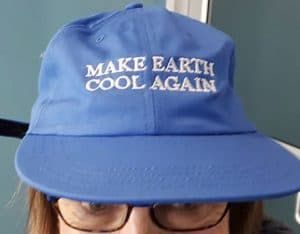
Tom Steyer, for his part, was faced with an entirely different set of issues from his particular trio of student questioners—the most memorable of which came from 23-year-old earth sciences master’s student Kathryn Bennett, who wanted to know what he would do about the expected massive release of greenhouse gases that would occur if the tundra were to melt. “Above all else, we want to avoid exploding that tundra bomb,” he said, and then derided the current lax efforts to deal with other releases of methane—such as what occurs with gas leaks from natural gas pipelines.
Steyer, a billionaire philanthropist who founded the environmental advocacy group NextGen America, also used his time on stage to focus on the need to make the most of the limited opportunities that any one president has to get through signature legislation. He noted that every president gets just one thing that he is remembered for—“Obama got health care, Trump got his tax cut, and I’d get action on climate change in my first 100 days—my number one priority.”
As the final candidate to speak in the day-long town hall forum, Steyer was in what was probably the best position to serve the most memorable lines to the crowd, which seemed to appreciate his hard-driving, concise, to the point, and sometimes pugnacious way of expressing himself. They applauded when he said: “I actually know the facts; I follow the science on a daily basis, multiple times a day”—a pointed reference to President Trump’s well-known tendency to play fast and loose in this area. (Think of the Sharpie-doctored hurricane map.) And they applauded even louder during the closing argument of Steyer’s time on stage, when this final speaker in a day full of speeches about dealing with climate change said: “This will be so fun. And when was the last time that America kicked ass doing the right thing?”
So it turned out that so far as getting to the meat of the issues goes, the primary campaign can be messy, but it can work, too. If you really want to get at the substance of what the candidates are offering, you can see and hear what they are at least proposing to do in office.
You just have to live in New Hampshire.
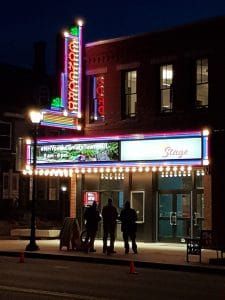
Together, we make the world safer.
The Bulletin elevates expert voices above the noise. But as an independent nonprofit organization, our operations depend on the support of readers like you. Help us continue to deliver quality journalism that holds leaders accountable. Your support of our work at any level is important. In return, we promise our coverage will be understandable, influential, vigilant, solution-oriented, and fair-minded. Together we can make a difference.
















Yes! We need action on climate change NOW from the authorities in power in the government, but with Trump and criminal gang still running things. and obstructing everything, it makes it unlikely to accomplish anything. We need to get these thugs out and it looks like we have to wait for the November election for THE PEOPLE to decide. I do hope we have a Progressive president taking office but that may not happen–the Democrats are also in serious disarray and the rethuglicans will use to their advantage, with foreign help to boot. I guess we pray very hard for… Read more »